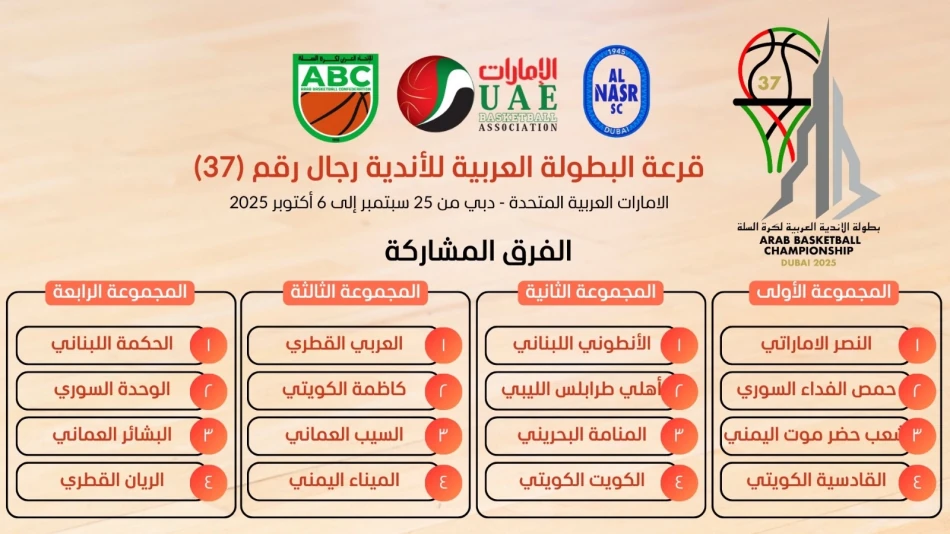
Balanced Roster Leads Al-Nasr to Triumph in Arab Basketball Championship
Dubai Set to Host Elite Arab Basketball Championship as Tournament Expands Foreign Player Rules
The 37th Arab Club Basketball Championship will bring together 16 premier teams in Dubai from September 25 to October 6, featuring a significant rule change that allows three foreign professionals per team instead of the previous limit of two foreigners plus one Arab player. This expansion signals the tournament's ambition to elevate competitive standards and attract higher-caliber international talent to Arab basketball.
Balanced Groups Promise Intense Competition
Sunday's draw produced four evenly matched groups that set the stage for compelling matchups at Al Nasr Club's venue. Host team Al Nasr finds itself in Group 1 alongside Syria's Homs Al Fedaa, Yemen's Shaab Hadramout, and Kuwait's Al Qadisiya. The defending champions, Qatar's Al Arabi, headline Group 3 with Kuwait's Kazma, Oman's Al Seeb, and Yemen's Al Mina.
Groups 2 and 4 feature equally competitive lineups, with Lebanon's Al Antouni, Libya's Ahly Tripoli, Bahrain's Al Manama, and Kuwait's Al Kuwait forming the second group. The fourth group brings together Lebanon's Al Hikma, Syria's Al Wahda, Qatar's Al Rayyan, and Oman's Al Bashair.
Foreign Player Rule Change Signals Professional Evolution
The tournament's decision to expand foreign player quotas represents a strategic shift toward professionalizing Arab basketball. By allowing three international professionals per team, organizers are following a global trend seen in top-tier leagues worldwide that prioritize talent acquisition over nationality restrictions.
Regional Basketball Development Strategy
This rule modification aligns with broader regional sports development initiatives, particularly in the Gulf states where significant investment in professional sports infrastructure continues. The UAE's hosting of the championship reinforces Dubai's position as a regional sports hub, complementing its role in hosting international tournaments across multiple disciplines.
The change could attract higher-profile international players who might previously have chosen more lucrative opportunities in Europe or Asia, potentially raising the tournament's global profile and commercial value.
Market Implications for Arab Basketball
The expanded foreign player allowance creates immediate opportunities for player agents and international basketball talent looking for competitive platforms in emerging markets. Teams with stronger financial backing may gain competitive advantages through superior recruitment, potentially accelerating the professionalization divide between well-funded clubs and traditional local teams.
This development mirrors similar evolutionary phases in other regional tournaments, such as the Basketball Champions League Asia and various Gulf football competitions that expanded foreign player quotas to enhance quality and marketability.
Championship Logistics and Technical Preparations
Tournament organizers will conduct a technical meeting in Dubai one day before competition begins, finalizing match protocols and officiating procedures. This timing allows for last-minute adjustments while ensuring all participating teams understand the modified regulations, particularly regarding the new foreign player framework.
The October 6 conclusion date positions the championship strategically within the international basketball calendar, avoiding conflicts with major professional leagues' seasons while maximizing player availability during the traditional tournament window.
Most Viewed News

 Sara Khaled
Sara Khaled






